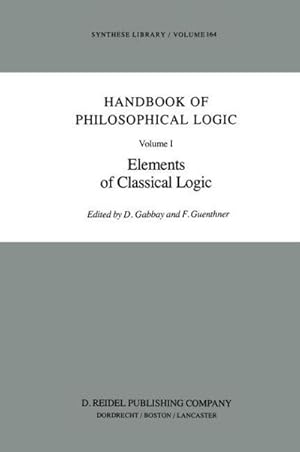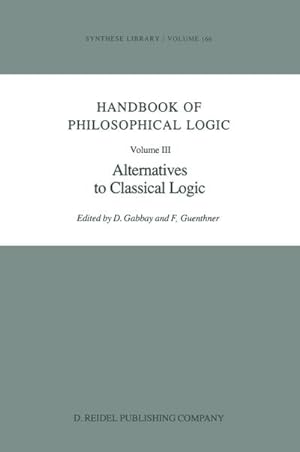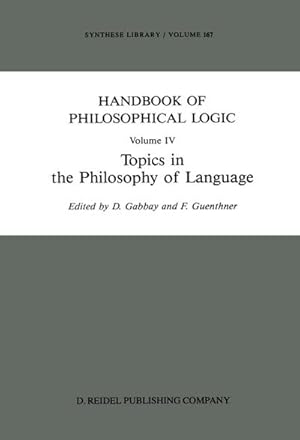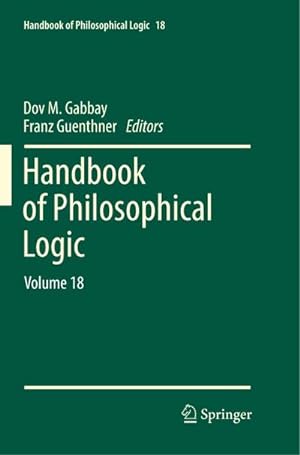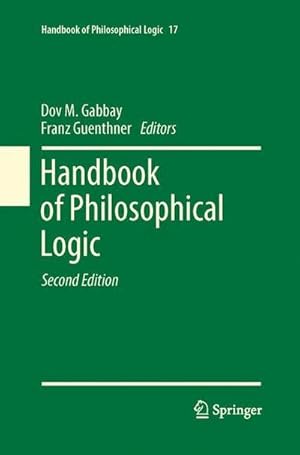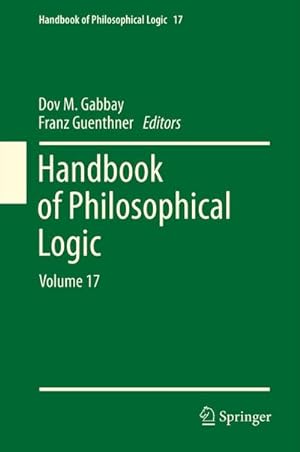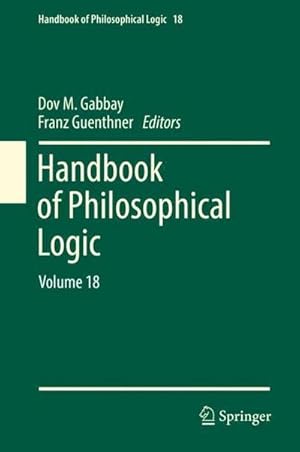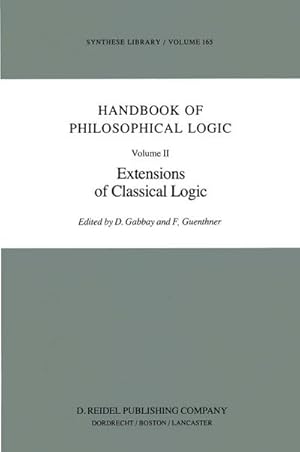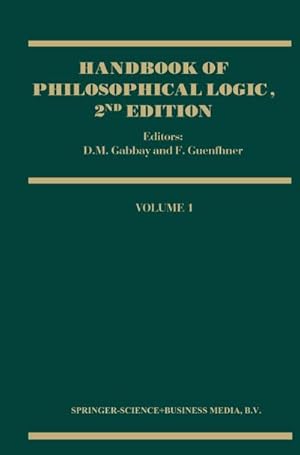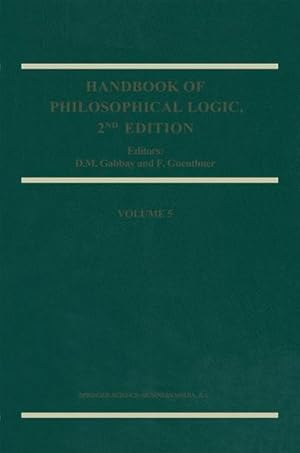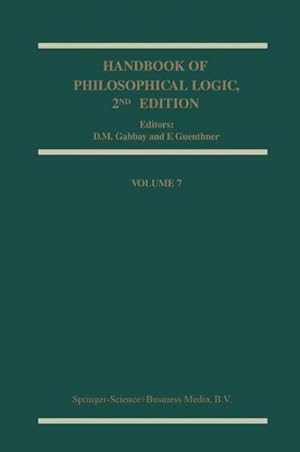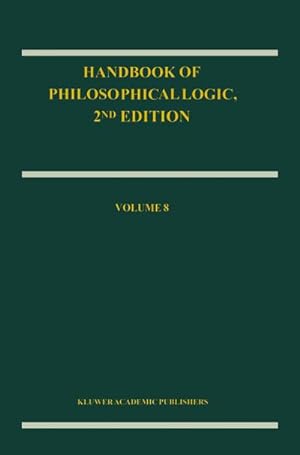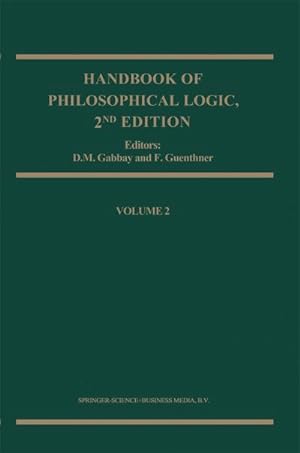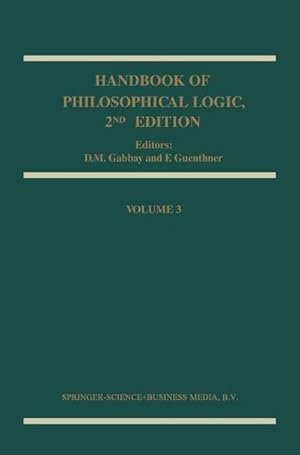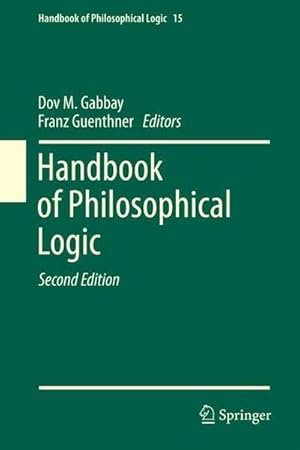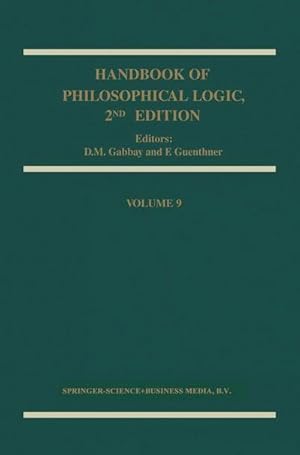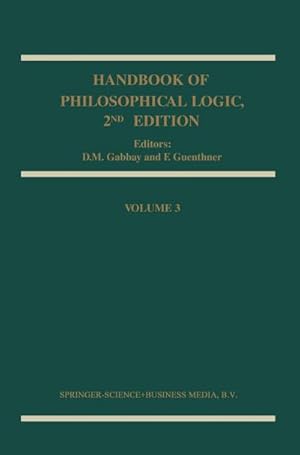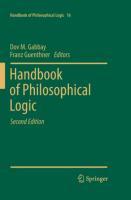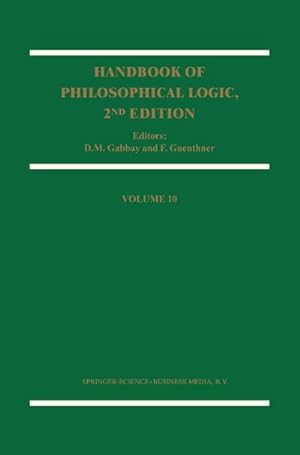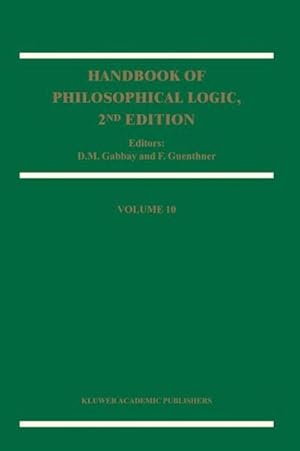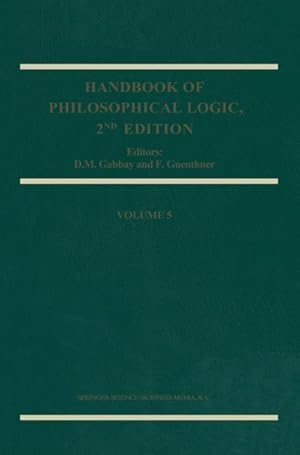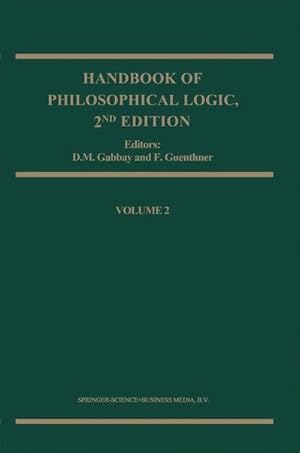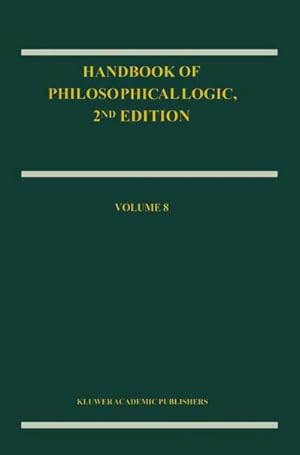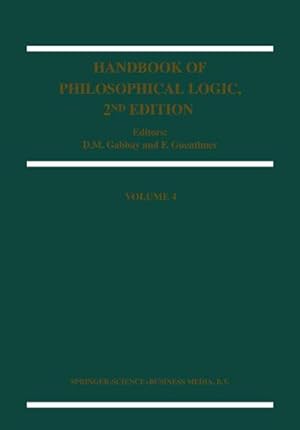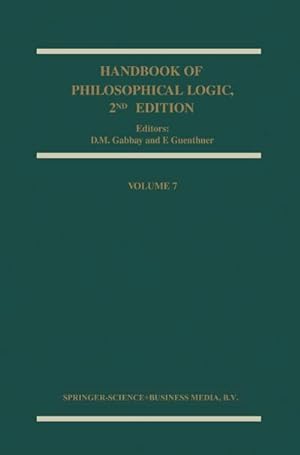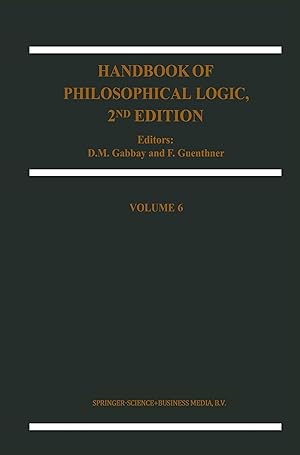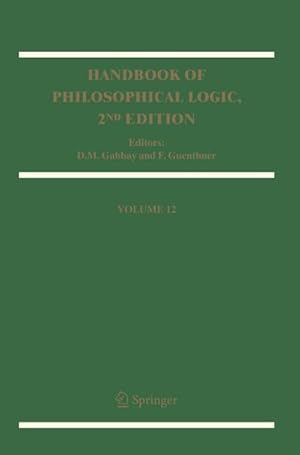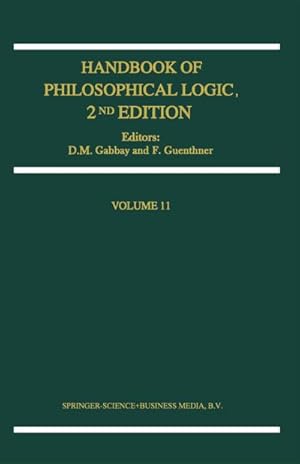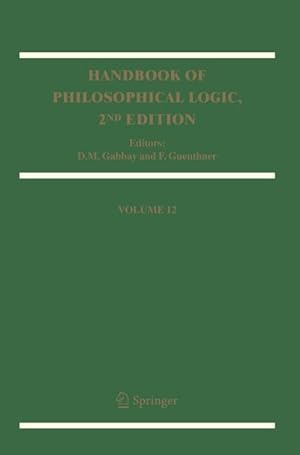guenthner franz (56 Ergebnisse)
Produktart
- Alle Produktarten
- Bücher (56)
- Magazine & Zeitschriften
- Comics
- Noten
- Kunst, Grafik & Poster
- Fotografien
- Karten
-
Manuskripte &
Papierantiquitäten
Zustand
Einband
Weitere Eigenschaften
Gratisversand
Land des Verkäufers
Verkäuferbewertung
-
Handbook of Philosophical Logic : Volume I: Elements of Classical Logic
Verlag: Springer Netherlands, 2011
ISBN 10: 9400970684ISBN 13: 9789400970687
Anbieter: AHA-BUCH GmbH, Einbeck, Deutschland
Buch
Taschenbuch. Zustand: Neu. Druck auf Anfrage Neuware - Printed after ordering - The aim of the first volume of the present Handbook of Philosophical Logic is essentially two-fold: First of all, the chapters in this volume should provide a concise overview of the main parts of classical logic. Second, these chapters are intended to present all the relevant background material necessary for the understanding of the contributions which are to follow in the next three volumes. We have thought it to be of importance that the connections between classical logic and its 'extensions' (covered in Volume 11) as well as its most important 'alternatives' (covered in Volume Ill) be brought out clearly from the start. The first chapter presents a clear and detailed picture of the range of what is generally taken to be the standard logical framework, namely, predicate (or first-order quantificational) logic. On the one hand, this chapter surveys both propositionai logic and first-order predicate logic and, on the other hand, presents the main metalogical results obtained for them. Chapter 1. 1 also contains a discussion of the limits of first-order logic, i. e. it presents an answer to the question: Why has predicate logic played such a formidable role in the formalization of mathematics and in the many areas of philo sophical and linguistic applications Chapter 1. 1 is prerequisite for just about all the other chapters in the entire Handbook, while the other chapters in Volume I provide more detailed discussions of material developed or hinted at in the first chapter.
-
Handbook of Philosophical Logic : Volume III: Alternatives to Classical Logic
Verlag: Springer Netherlands, 2011
ISBN 10: 9401088012ISBN 13: 9789401088015
Anbieter: AHA-BUCH GmbH, Einbeck, Deutschland
Buch
Taschenbuch. Zustand: Neu. Druck auf Anfrage Neuware - Printed after ordering - This volume presents a number of systems of logic which can be considered as alternatives to classical logic. The notion of what counts as an alternative is a somewhat problematic one. There are extreme views on the matter of what is the 'correct' logical system and whether one logical system (e. g. classical logic) can represent (or contain) all the others. The choice of the systems presented in this volume was guided by the following criteria for including a logic as an alternative: (i) the departure from classical logic in accepting or rejecting certain theorems of classical logic following intuitions arising from significant application areas and/or from human reasoning; (ii) the alternative logic is well-established and well-understood mathematically and is widely applied in other disciplines such as mathematics, physics, computer science, philosophy, psychology, or linguistics. A number of other alternatives had to be omitted for the present volume (e. g. recent attempts to formulate so-called 'non-monotonic' reason ing systems). Perhaps these can be included in future extensions of the Handbook of Philosophical Logic. Chapter 1 deals with partial logics, that is, systems where sentences do not always have to be either true or false, and where terms do not always have to denote. These systems are thus, in general, geared towards reasoning in partially specified models. Logics of this type have arisen mainly from philo sophical and linguistic considerations; various applications in theoretical computer science have also been envisaged.
-
Handbook of Philosophical Logic : Volume IV: Topics in the Philosophy of Language
Verlag: Springer Netherlands, 2011
ISBN 10: 9401070210ISBN 13: 9789401070218
Anbieter: AHA-BUCH GmbH, Einbeck, Deutschland
Buch
Taschenbuch. Zustand: Neu. Druck auf Anfrage Neuware - Printed after ordering - conceptual, realist) theories of predication. Chapter IV.4 centers on an important class of expressions used for predication in connection with quantities: mass expressions. This chapter reviews the most well-known approaches to mass terms and the ontological proposals related to them. In addition to quantification and predication, matters of reference have constituted the other overriding theme for semantic theories in both philosophical logic and the semantics of natural languages. Chapter IV.5 of how the semantics of proper names and descrip presents an overview tions have been dealt with in recent theories of reference. Chapter IV.6 is concerned with the context-dependence of reference, in particular, with the semantics of indexical expressions. The topic of Chapter IV.7 is related to predication as it surveys some of the central problems of ascribing propositional attitudes to agents. Chap ter IV.8 deals with the analysis of the main temporal aspects of natural language utterances. Together these two chapters give a good indication of the intricate complexities that arise once modalities of one or the other sort enter on the semantic stage. in philosophical Chapter IV.9 deals with another well-known topic logic: presupposition, an issue on the borderline of semantics and prag matics. The volume closes with an extensive study of the Liar paradox and its many implications for the study of language (as for example, self reference, truth concepts and truth definitions).
-
Handbook of Philosophical Logic : Volume 18
Verlag: Springer International Publishing, 2019
ISBN 10: 3030073998ISBN 13: 9783030073992
Anbieter: AHA-BUCH GmbH, Einbeck, Deutschland
Buch
Taschenbuch. Zustand: Neu. Druck auf Anfrage Neuware - Printed after ordering - This eighteenth volume of the acclaimed Handbook of Philosophical Logic includes many contributors who are among the most famous leading figures of applied philosophical logic of our time. Coverage includes deontic logic, practical reasoning, homogeneous and heterogeneous logical proportion, and talmudic logic. Overall, it will appeal to students, practitioners, and researchers looking for an authoritative resource in these areas.The contributors first explore models in terms of dynamic logics for information-driven agency. The paradigm they use is dynamic-epistemic logics for knowledge and belief and their current extensions to the statics and dynamics of agents' preferences. Next, in the presentation of preference based agency, coverage examines a large number of themes, including interactive social agents and scenarios with long term patterns emerging over time. From here, the book moves on to offer an introduction to homogeneous and heterogeneous logical proportions.Readers will also learn more about the general challenge that the problem of formalizing practical reasoning presents to logical theory. The contributors survey the existing resources that might contribute to the development of such a formalization. They conclude that, while a robust, adequate logic of practical reasoning is not yet in place, the materials for developing such a logic are now available.The last chapter explores topics that deal with the logic of Jewish law and the logic of the Talmud. This includes obligations and prohibitions in Talmudic deontic logic, the handling of loops in Talmudic logic, Temporal Talmudic logic, and quantum states and disjunctive attacks in Talmudic logic. The Talmudic logic system presented are also exported to general logic and to Artificial Intelligence.
-
Handbook of Philosophical Logic : Volume 17
Verlag: Springer Netherlands, 2015
ISBN 10: 940178096XISBN 13: 9789401780964
Anbieter: AHA-BUCH GmbH, Einbeck, Deutschland
Buch
Taschenbuch. Zustand: Neu. Druck auf Anfrage Neuware - Printed after ordering - This second edition of the Handbook of Philosophical Logic reflects great changes in the landscape of philosophical logic since the first edition. It gives readers an idea of that landscape and its relation to computer science and formal language and artificial intelligence. It shows how the increased demand for philosophical logic from computer science and artificial intelligence and computational linguistics accelerated the development of the subject directly and indirectly. This development in turn, directly pushed research forward, stimulated by the needs of applications. New logic areas became established and old areas were enriched and expanded. At the same time, it socially provided employment for generations of logicians residing in computer science, linguistics and electrical engineering departments which of course helped keep the logic community to thrive. The many contributors to this Handbook are active in these application areas and are among the most famous leading figures of applied philosophical logic of our times.
-
Handbook of Philosophical Logic : Volume 17
Verlag: Springer Netherlands, 2013
ISBN 10: 9400765991ISBN 13: 9789400765993
Anbieter: AHA-BUCH GmbH, Einbeck, Deutschland
Buch
Buch. Zustand: Neu. Druck auf Anfrage Neuware - Printed after ordering - This second edition of the Handbook of Philosophical Logic reflects great changes in the landscape of philosophical logic since the first edition. It gives readers an idea of that landscape and its relation to computer science and formal language and artificial intelligence. It shows how the increased demand for philosophical logic from computer science and artificial intelligence and computational linguistics accelerated the development of the subject directly and indirectly. This development in turn, directly pushed research forward, stimulated by the needs of applications. New logic areas became established and old areas were enriched and expanded. At the same time, it socially provided employment for generations of logicians residing in computer science, linguistics and electrical engineering departments which of course helped keep the logic community to thrive. The many contributors to this Handbook are active in these application areas and are among the most famous leading figures of applied philosophical logic of our times.
-
Handbook of Philosophical Logic : Volume 18
Verlag: Springer International Publishing, 2018
ISBN 10: 3319977547ISBN 13: 9783319977546
Anbieter: AHA-BUCH GmbH, Einbeck, Deutschland
Buch
Buch. Zustand: Neu. Druck auf Anfrage Neuware - Printed after ordering - This eighteenth volume of the acclaimed Handbook of Philosophical Logic includes many contributors who are among the most famous leading figures of applied philosophical logic of our time. Coverage includes deontic logic, practical reasoning, homogeneous and heterogeneous logical proportion, and talmudic logic. Overall, it will appeal to students, practitioners, and researchers looking for an authoritative resource in these areas.The contributors first explore models in terms of dynamic logics for information-driven agency. The paradigm they use is dynamic-epistemic logics for knowledge and belief and their current extensions to the statics and dynamics of agents' preferences. Next, in the presentation of preference based agency, coverage examines a large number of themes, including interactive social agents and scenarios with long term patterns emerging over time. From here, the book moves on to offer an introduction to homogeneous and heterogeneous logical proportions.Readers will also learn more about the general challenge that the problem of formalizing practical reasoning presents to logical theory. The contributors survey the existing resources that might contribute to the development of such a formalization. They conclude that, while a robust, adequate logic of practical reasoning is not yet in place, the materials for developing such a logic are now available.The last chapter explores topics that deal with the logic of Jewish law and the logic of the Talmud. This includes obligations and prohibitions in Talmudic deontic logic, the handling of loops in Talmudic logic, Temporal Talmudic logic, and quantum states and disjunctive attacks in Talmudic logic. The Talmudic logic system presented are also exported to general logic and to Artificial Intelligence.
-
Handbook of Philosophical Logic : Volume II: Extensions of Classical Logic
Verlag: Springer Netherlands, 2011
ISBN 10: 9400962614ISBN 13: 9789400962613
Anbieter: AHA-BUCH GmbH, Einbeck, Deutschland
Buch
Taschenbuch. Zustand: Neu. Druck auf Anfrage Neuware - Printed after ordering - The chapters in the present volume go beyond 'classical' extensional logic with respect to one important factor: they all include among the semantic constituents representations of so-called 'possible worlds'. The inclusion of such 'indices' has turned out to be the semantic mainstay in dealing with a number of issues having to do with intensional features of natural and artificial languages. It is, of course, an open question whether 'possible world' semantics is in the final analysis the proper solution to the many problems and puzzles intensional constructions raise for the logical analysis of the many varieties of discourse. At present, there seem to be about as many opponents as proponents with regard to the usefulness of having the semantics of intensional languages based on possible world constructs. Some attempts to come to grips with intensional phenomena which are not couched in the possible world framework are discussed in Volume IV of the Handbook. Chapter 1 is an extensive survey of the main systems of (propositional) modal logic including the most important meta-mathematical results and the techniques used in establishing these. It introduces the basic terminology and semantic machinery applied in one way or another in many of the subsequent chapters. Chapter 2 discusses the most significant developments in (propositional) tense logic which can of course be regarded as a special kind of modal logic, where the possible world indices are simply (ordered) moments of time.
-
Handbook of Philosophical Logic
Verlag: Springer Netherlands, 2011
ISBN 10: 904815717XISBN 13: 9789048157174
Anbieter: AHA-BUCH GmbH, Einbeck, Deutschland
Buch
Taschenbuch. Zustand: Neu. Druck auf Anfrage Neuware - Printed after ordering - It is with great pleasure that we are presenting to the community the second edition of this extraordinary handbook. It has been over 15 years since the publication of the first edition and there have been great changes in the landscape of philosophical logic since then. The first edition has proved invaluable to generations of students and researchers in formal philosophy and language, as well as to consumers of logic in many applied areas. The main logic article in the Encyclopaedia Britannica 1999 has described the first edition as 'the best starting point for exploring any of the topics in logic'. We are confident that the second edition will prove to be just as good. ! The first edition was the second handbook published for the logic commu nity. It followed the North Holland one volume Handbook of Mathematical Logic, published in 1977, edited by the late Jon Barwise, The four volume Handbook of Philosophical Logic, published 1983-1989 came at a fortunate temporal junction at the evolution of logic. This was the time when logic was gaining ground in computer science and artificial intelligence circles. These areas were under increasing commercial pressure to provide devices which help and/or replace the human in his daily activity. This pressure required the use of logic in the modelling of human activity and organisa tion on the one hand and to provide the theoretical basis for the computer program constructs on the other.
-
Handbook of Philosophical Logic
Verlag: Springer Netherlands, 2002
ISBN 10: 1402002351ISBN 13: 9781402002359
Anbieter: AHA-BUCH GmbH, Einbeck, Deutschland
Buch
Buch. Zustand: Neu. Druck auf Anfrage Neuware - Printed after ordering - It is with great pleasure that we are presenting to the community the second edition of this extraordinary handbook. It has been over 15 years since the publication of the first edition and there have been great changes in the landscape of philosophical logic since then. The first edition has proved invaluable to generations of students and researchers in formal philosophy and language, as well as to consumers of logic in many applied areas. The main logic article in the Encyclopaedia Britannica 1999 has described the first edition as 'the best starting point for exploring any of the topics in logic'. We are confident that the second edition will prove to be just as good,! The first edition was the second handbook published for the logic commu nity. It followed the North Holland one volume Handbook of Mathematical Logic, published in 1977, edited by the late Jon Barwise. The four volume Handbook of Philosophical Logic, published 1983-1989 came at a fortunate temporal junction at the evolution of logic. This was the time when logic was gaining ground in computer science and artificial intelligence circles. These areas were under increasing commercial pressure to provide devices which help and/or replace the human in his daily activity. This pressure required the use of logic in the modelling of human activity and organisa tion on the one hand and to provide the theoretical basis for the computer program constructs on the other.
-
Handbook of Philosophical Logic
Verlag: Springer Netherlands, 2002
ISBN 10: 1402006993ISBN 13: 9781402006999
Anbieter: AHA-BUCH GmbH, Einbeck, Deutschland
Buch
Buch. Zustand: Neu. Druck auf Anfrage Neuware - Printed after ordering - It is with great pleasure that we are presenting to the community the second edition of this extraordinary handbook. It has been over 15 years since the publication of the first edition and there have been great changes in the landscape of philosophical logic since then. The first edition has proved invaluable to generations of students and researchers in formal philosophy and language, as well as to consumers of logic in many applied areas. The main logic article in the Encyclopaedia Britannica 1999 has described the first edition as 'the best starting point for exploring any of the topics in logic'. We are confident that the second edition will prove to be just as good! The first edition was the second handbook published for the logic com- nity. It followed the North Holland one volume Handbook of Mathematical Logic, published in 1977, edited by the late Jon Barwise. The four volume Handbook of Philosophical Logic, published 1983-1989 came at a fortunate temporal junction at the evolution of logic. This was the time when logic was gaining ground in computer science and artificial intelligence circles. These areas were under increasing commercial pressure to provide devices which help and/or replace the human in his daily activity. This pressure required the use of logic in the modelling of human activity and organi- tion on the one hand and to provide the theoretical basis for the computer program constructs on the other.
-
Handbook of Philosophical Logic
Verlag: Springer Netherlands, 2002
ISBN 10: 1402005997ISBN 13: 9781402005992
Anbieter: AHA-BUCH GmbH, Einbeck, Deutschland
Buch
Buch. Zustand: Neu. Druck auf Anfrage Neuware - Printed after ordering - It is with great pleasure that we are presenting to the community the second edition of this extraordinary handbook. It has been over 15 years since the publication of the first edition and there have been great changes in the landscape of philosophical logic since then. The first edition has proved invaluable to generations of students and researchers in formal philosophy and language, as well as to consumers of logic in many applied areas. The main logic article in the Encyclopaedia Britannica 1999 has described the first edition as 'the best starting point for exploring any of the topics in logic'. We are confident that the second edition will prove to be just as good! The first edition was the second handbook published for the logic commu nity. It followed the North Holland one volume Handbook of Mathematical Logic, published in 1977, edited by the late Jon Barwise. The four volume Handbook of Philosophical Logic, published 1983-1989 came at a fortunate temporal junction at the evolution of logic. This was the time when logic was gaining ground in computer science and artificial intelligence circles. These areas were under increasing commercial pressure to provide devices which help and/or replace the human in his daily activity. This pressure required the use of logic in the modelling of human activity and organisa tion on the one hand and to provide the theoretical basis for the computer program constructs on the other.
-
Handbook of Philosophical Logic : Volume 8
Verlag: Springer Netherlands, 2002
ISBN 10: 1402006659ISBN 13: 9781402006654
Anbieter: AHA-BUCH GmbH, Einbeck, Deutschland
Buch
Buch. Zustand: Neu. Druck auf Anfrage Neuware - Printed after ordering - suchquestionsforcenturies(unrestrictedbythecapabilitiesofanyhard ware). Theprinciplesgoverningtheinteractionofseveralprocesses,forexample, areabstractansimilartoprinciplesgoverningthecooperationoftwolarge organisation.Adetailedrulebasedeffectivebutrigidbureaucracyisvery muchsimilartoacomplexcomputerprogramhandlingandmanipulating data. Myguessisthattheprinciplesunderlyingoneareverymuchthe sameasthoseunderlyingtheother. Ibelievethedayisnotfarawayinthefuturewhenthecomputerscientist willwakeuponemorningwiththerealisationthatheisactuallyakindof formalphilosopher! TheprojectednumberofvolumesforthisHandbookisabout18.The subjecthasevolvedanditsareashavebecomeinterrelatedtosuchanextent thatitnolongermakessensetodedicatevolumestotopics.However,the volumesdofollowsomenaturalgroupingsofchapters. Iwouldliketothankourauthorsarereadersfortheircontributionsand theircommitmentinmakingthisHandbookasuccess. Thanksalsoto ourpublicationadministratorMrsJ.Spurrforherusualdedicationand excellenceandtoKluwerAcademicPublishersfortheircontinuingsupport fortheHandbook. DovGabbay King'sCollegeLondon x Logic II IT Natural Program Artificialin Logic p- language controlspec telligence gramming processing ification, verification, concurrency Temporal Expressive Expressive Planning. Extension of logic poweroftense power for re Time depen Horn clause operators. currentevents. dent data. with time Temporal Specification Eventcalculus. capability. indices. Sepa of tempo- Persistence Eventcalculus. rationofpast ral control. throughtime Temporallogic fromfuture Decisionprob the Frame programming. Problem.Tem lems. Model checking. poral query language. temporal transactions. Modal logic. generalised Actionlogic Beliefrevision. Negation by Multi-modal quantifiers Inferential failure and logics databases modality Algorithmic Discourse rep New logics. Generaltheory Proceduralap proof resentation. Generic theo of reasoning. proachtologic Direct com- remprovers Non-monotonic putation on systems linguisticinput Non Resolving Loopchecking. Intrinsiclogical Negation by monotonic ambigui- Non-monotonic discipline for failure.Deduc reasoning ties. Machine decisionsabout AI. Evolving tivedatabases translation. loops. Faults and com Document insystems. municating classification. databases Relevance theory Probabilistic logicalanalysis Realtimesys Expert sys Semantics for and fuzzy oflanguage tems tems.Machine logicprograms logic learning Intuitionistic Quantifiers in Constructive Intuitionistic Horn clause logic logic reasoning and logicisabetter logic is really proof theory logical basis intuitionistic.
-
Handbook of Philosophical Logic
Verlag: Springer Netherlands, 2001
ISBN 10: 0792371267ISBN 13: 9780792371267
Anbieter: AHA-BUCH GmbH, Einbeck, Deutschland
Buch
Buch. Zustand: Neu. Druck auf Anfrage Neuware - Printed after ordering - It is with great pleasure that we are presenting to the community the second edition of this extraordinary handbook. It has been over 15 years since the publication of the first edition and there have been great changes in the landscape of philosophical logic since then. The first edition has proved invaluable to generations of students and researchers in formal philosophy and language, as weIl as to consumers of logic in many applied areas. The main logic artiele in the Encyelopaedia Britannica 1999 has described the first edition as 'the best starting point for exploring any of the topics in logic'. We are confident that the second edition will prove to be just as good. ! The first edition was the second handbook published for the logic commu nity. It followed the North Holland one volume Handbook 0/ Mathematical Logic, published in 1977, edited by the late Jon Barwise. The four volume Handbook 0/ Philosophical Logic, published 1983-1989 came at a fortunate at the evolution of logic. This was the time when logic temporal junction was gaining ground in computer science and artificial intelligence cireles. These areas were under increasing commercial pressure to provide devices which help andjor replace the human in his daily activity. This pressure required the use of logic in the modelling of human activity and organisa tion on the one hand and to provide the theoretical basis for the computer program constructs on the other.
-
Handbook of Philosophical Logic
Verlag: Springer Netherlands, 2001
ISBN 10: 0792371607ISBN 13: 9780792371601
Anbieter: AHA-BUCH GmbH, Einbeck, Deutschland
Buch
Buch. Zustand: Neu. Druck auf Anfrage Neuware - Printed after ordering - It is with great pleasure that we are presenting to the community the second edition of this extraordinary handbook. It has been over 15 years since the publication of the first edition and there have been great changes in the landscape of philosophical logic since then. The first edition has proved invaluable to generations of students and researchers in formal philosophy and language, as well as to consumers of logic in many applied areas. The main logic artiele in the Encyelopaedia Britannica 1999 has described the first edition as 'the best starting point for exploring any of the topics in logic'. We are confident that the second edition will prove to be just as good. ! The first edition was the second handbook published for the logic commu nity. It followed the North Holland one volume Handbook 0/ Mathematical Logic, published in 1977, edited by the late Jon Barwise. The four volume Handbook 0/ Philosophical Logic, published 1983-1989 came at a fortunate temporal junction at the evolution of logic. This was the time when logic was gaining ground in computer science and artificial intelligence cireles. These areas were under increasing commercial press ure to provide devices which help and/or replace the human in his daily activity. This pressure required the use of logic in the modelling of human activity and organisa tion on the one hand and to provide the theoretical basis for the computer program constructs on the other.
-
Handbook of Philosophical Logic : Volume 15
Verlag: Springer Netherlands, 2013
ISBN 10: 9400734514ISBN 13: 9789400734517
Anbieter: AHA-BUCH GmbH, Einbeck, Deutschland
Buch
Taschenbuch. Zustand: Neu. Druck auf Anfrage Neuware - Printed after ordering - Lambda Calculi: A Guide Interpolation and Definability Discourse Representation Theory.
-
Handbook of Philosophical Logic
Verlag: Springer Netherlands, 2010
ISBN 10: 9048160553ISBN 13: 9789048160556
Anbieter: AHA-BUCH GmbH, Einbeck, Deutschland
Buch
Taschenbuch. Zustand: Neu. Druck auf Anfrage Neuware - Printed after ordering - It is with great pleasure that we are presenting to the community the second edition of this extraordinary handbook. It has been over 15 years since the publication of the first edition and there have been great changes in the landscape of philosophical logic since then. The first edition has proved invaluable to generations of students and researchers in formal philosophy and language, as well as to consumers of logic in many applied areas. The main logic article in the Encyclopaedia Britannica 1999 has described the first edition as 'the best starting point for exploring any of the topics in logic'. We are confident that the second edition will prove to be just as good! The first edition was the second handbook published for the logic com- nity. It followed the North Holland one volume Handbook of Mathematical Logic, published in 1977, edited by the late Jon Barwise. The four volume Handbook of Philosophical Logic, published 1983-1989 came at a fortunate temporal junction at the evolution of logic. This was the time when logic was gaining ground in computer science and artificial intelligence circles. These areas were under increasing commercial pressure to provide devices which help and/or replace the human in his daily activity. This pressure required the use of logic in the modelling of human activity and organi- tion on the one hand and to provide the theoretical basis for the computer program constructs on the other.
-
Handbook of Philosophical Logic
Verlag: Springer Netherlands, 2010
ISBN 10: 904815765XISBN 13: 9789048157655
Anbieter: AHA-BUCH GmbH, Einbeck, Deutschland
Buch
Taschenbuch. Zustand: Neu. Druck auf Anfrage Neuware - Printed after ordering - It is with great pleasure that we are presenting to the community the second edition of this extraordinary handbook. It has been over 15 years since the publication of the first edition and there have been great changes in the landscape of philosophical logic since then. The first edition has proved invaluable to generations of students and researchers in formal philosophy and language, as well as to consumers of logic in many applied areas. The main logic artiele in the Encyelopaedia Britannica 1999 has described the first edition as 'the best starting point for exploring any of the topics in logic'. We are confident that the second edition will prove to be just as good. ! The first edition was the second handbook published for the logic commu nity. It followed the North Holland one volume Handbook 0/ Mathematical Logic, published in 1977, edited by the late Jon Barwise. The four volume Handbook 0/ Philosophical Logic, published 1983-1989 came at a fortunate temporal junction at the evolution of logic. This was the time when logic was gaining ground in computer science and artificial intelligence cireles. These areas were under increasing commercial press ure to provide devices which help and/or replace the human in his daily activity. This pressure required the use of logic in the modelling of human activity and organisa tion on the one hand and to provide the theoretical basis for the computer program constructs on the other.
-
Handbook of Philosophical Logic
Verlag: Springer Netherlands, 2013
ISBN 10: 9400734603ISBN 13: 9789400734609
Anbieter: moluna, Greven, Deutschland
Buch
Zustand: New.
Mehr Angebote von anderen Verkäufern bei ZVAB
Neu ab EUR 136,16
-
Handbook of Philosophical Logic : Volume 10
Verlag: Springer Netherlands, 2010
ISBN 10: 9048164311ISBN 13: 9789048164318
Anbieter: AHA-BUCH GmbH, Einbeck, Deutschland
Buch
Taschenbuch. Zustand: Neu. Druck auf Anfrage Neuware - Printed after ordering - It is with great pleasure that we are presenting to the community the second edition of this extraordinary handbook. It has been over 15 years since the publication of the first edition and there have been great changes in the landscape of philosophical logic since then. The first edition has proved invaluable to generations of students and researchers in formal philosophy and language, as weIl as to consumers of logic in many applied areas. The main logic article in the Encyclopaedia Britannica 1999 has described the first edition as 'the best starting point for exploring any of the topics in logic'. We are confident that the second edition will prove to be just as good! The first edition was the second handbook published for the logic commu nity. It followed the North Holland one volume Handbook 0/ Mathematical Logic, published in 1977, edited by the late Jon Barwise. The four volume Handbook 0/ Philosophical Logic, published 1983-1989 came at a fortunate temporal junction at the evolution of logic. This was the time when logic was gaining ground in computer science and artificial intelligence circles. These areas were under increasing commercial pressure to provide devices which help and/or replace the human in his daily activity. This pressure required the use of logic in the modelling of human activity and organisa tion on the one hand and to provide the theoretical basis for the computer program constructs on the other.
-
Handbook of Philosophical Logic : Volume 10
Verlag: Springer Netherlands, 2003
ISBN 10: 1402016441ISBN 13: 9781402016448
Anbieter: AHA-BUCH GmbH, Einbeck, Deutschland
Buch
Buch. Zustand: Neu. Druck auf Anfrage Neuware - Printed after ordering - It is with great pleasure that we are presenting to the community the second edition of this extraordinary handbook. It has been over 15 years since the publication of the first edition and there have been great changes in the landscape of philosophical logic since then. The first edition has proved invaluable to generations of students and researchers in formal philosophy and language, as weIl as to consumers of logic in many applied areas. The main logic article in the Encyclopaedia Britannica 1999 has described the first edition as 'the best starting point for exploring any of the topics in logic'. We are confident that the second edition will prove to be just as good! The first edition was the second handbook published for the logic commu nity. It followed the North Holland one volume Handbook 0/ Mathematical Logic, published in 1977, edited by the late Jon Barwise. The four volume Handbook 0/ Philosophical Logic, published 1983-1989 came at a fortunate temporal junction at the evolution of logic. This was the time when logic was gaining ground in computer science and artificial intelligence circles. These areas were under increasing commercial pressure to provide devices which help and/or replace the human in his daily activity. This pressure required the use of logic in the modelling of human activity and organisa tion on the one hand and to provide the theoretical basis for the computer program constructs on the other.
-
Handbook of Philosophical Logic
Verlag: Springer Netherlands, 2011
ISBN 10: 904815927XISBN 13: 9789048159277
Anbieter: AHA-BUCH GmbH, Einbeck, Deutschland
Buch
Taschenbuch. Zustand: Neu. Druck auf Anfrage Neuware - Printed after ordering - It is with great pleasure that we are presenting to the community the second edition of this extraordinary handbook. It has been over 15 years since the publication of the first edition and there have been great changes in the landscape of philosophical logic since then. The first edition has proved invaluable to generations of students and researchers in formal philosophy and language, as well as to consumers of logic in many applied areas. The main logic article in the Encyclopaedia Britannica 1999 has described the first edition as 'the best starting point for exploring any of the topics in logic'. We are confident that the second edition will prove to be just as good,! The first edition was the second handbook published for the logic commu nity. It followed the North Holland one volume Handbook of Mathematical Logic, published in 1977, edited by the late Jon Barwise. The four volume Handbook of Philosophical Logic, published 1983-1989 came at a fortunate temporal junction at the evolution of logic. This was the time when logic was gaining ground in computer science and artificial intelligence circles. These areas were under increasing commercial pressure to provide devices which help and/or replace the human in his daily activity. This pressure required the use of logic in the modelling of human activity and organisa tion on the one hand and to provide the theoretical basis for the computer program constructs on the other.
-
Handbook of Philosophical Logic
Verlag: Springer Netherlands, 2010
ISBN 10: 9048157536ISBN 13: 9789048157532
Anbieter: AHA-BUCH GmbH, Einbeck, Deutschland
Buch
Taschenbuch. Zustand: Neu. Druck auf Anfrage Neuware - Printed after ordering - It is with great pleasure that we are presenting to the community the second edition of this extraordinary handbook. It has been over 15 years since the publication of the first edition and there have been great changes in the landscape of philosophical logic since then. The first edition has proved invaluable to generations of students and researchers in formal philosophy and language, as weIl as to consumers of logic in many applied areas. The main logic artiele in the Encyelopaedia Britannica 1999 has described the first edition as 'the best starting point for exploring any of the topics in logic'. We are confident that the second edition will prove to be just as good. ! The first edition was the second handbook published for the logic commu nity. It followed the North Holland one volume Handbook 0/ Mathematical Logic, published in 1977, edited by the late Jon Barwise. The four volume Handbook 0/ Philosophical Logic, published 1983-1989 came at a fortunate at the evolution of logic. This was the time when logic temporal junction was gaining ground in computer science and artificial intelligence cireles. These areas were under increasing commercial pressure to provide devices which help andjor replace the human in his daily activity. This pressure required the use of logic in the modelling of human activity and organisa tion on the one hand and to provide the theoretical basis for the computer program constructs on the other.
-
Handbook of Philosophical Logic : Volume 8
Verlag: Springer Netherlands, 2012
ISBN 10: 9401039194ISBN 13: 9789401039192
Anbieter: AHA-BUCH GmbH, Einbeck, Deutschland
Buch
Taschenbuch. Zustand: Neu. Druck auf Anfrage Neuware - Printed after ordering - suchquestionsforcenturies(unrestrictedbythecapabilitiesofanyhard ware). Theprinciplesgoverningtheinteractionofseveralprocesses,forexample, areabstractansimilartoprinciplesgoverningthecooperationoftwolarge organisation.Adetailedrulebasedeffectivebutrigidbureaucracyisvery muchsimilartoacomplexcomputerprogramhandlingandmanipulating data. Myguessisthattheprinciplesunderlyingoneareverymuchthe sameasthoseunderlyingtheother. Ibelievethedayisnotfarawayinthefuturewhenthecomputerscientist willwakeuponemorningwiththerealisationthatheisactuallyakindof formalphilosopher! TheprojectednumberofvolumesforthisHandbookisabout18.The subjecthasevolvedanditsareashavebecomeinterrelatedtosuchanextent thatitnolongermakessensetodedicatevolumestotopics.However,the volumesdofollowsomenaturalgroupingsofchapters. Iwouldliketothankourauthorsarereadersfortheircontributionsand theircommitmentinmakingthisHandbookasuccess. Thanksalsoto ourpublicationadministratorMrsJ.Spurrforherusualdedicationand excellenceandtoKluwerAcademicPublishersfortheircontinuingsupport fortheHandbook. DovGabbay King'sCollegeLondon x Logic II IT Natural Program Artificialin Logic p- language controlspec telligence gramming processing ification, verification, concurrency Temporal Expressive Expressive Planning. Extension of logic poweroftense power for re Time depen Horn clause operators. currentevents. dent data. with time Temporal Specification Eventcalculus. capability. indices. Sepa of tempo- Persistence Eventcalculus. rationofpast ral control. throughtime Temporallogic fromfuture Decisionprob the Frame programming. Problem.Tem lems. Model checking. poral query language. temporal transactions. Modal logic. generalised Actionlogic Beliefrevision. Negation by Multi-modal quantifiers Inferential failure and logics databases modality Algorithmic Discourse rep New logics. Generaltheory Proceduralap proof resentation. Generic theo of reasoning. proachtologic Direct com- remprovers Non-monotonic putation on systems linguisticinput Non Resolving Loopchecking. Intrinsiclogical Negation by monotonic ambigui- Non-monotonic discipline for failure.Deduc reasoning ties. Machine decisionsabout AI. Evolving tivedatabases translation. loops. Faults and com Document insystems. municating classification. databases Relevance theory Probabilistic logicalanalysis Realtimesys Expert sys Semantics for and fuzzy oflanguage tems tems.Machine logicprograms logic learning Intuitionistic Quantifiers in Constructive Intuitionistic Horn clause logic logic reasoning and logicisabetter logic is really proof theory logical basis intuitionistic.
-
Handbook of Philosophical Logic
Verlag: Springer Netherlands, 2012
ISBN 10: 904815877XISBN 13: 9789048158775
Anbieter: AHA-BUCH GmbH, Einbeck, Deutschland
Buch
Taschenbuch. Zustand: Neu. Druck auf Anfrage Neuware - Printed after ordering - It is with great pleasure that we are presenting to the community the second edition of this extraordinary handbook. It has been over 15 years since the publication of the first edition and there have been great changes in the landscape of philosophical logic since then. The first edition has proved invaluable to generations of students and researchers in formal philosophy and language, as well as to consumers of logic in many applied areas. The main logic artiele in the Encyelopaedia Britannica 1999 has described the first edition as 'the best starting point for exploring any of the topics in logic'. We are confident that the second edition will prove to be just as good. ! The first edition was the second handbook published for the logic commu nity. It followed the North Holland one volume Handbook 0/ Mathematical Logic, published in 1977, edited by the late Jon Barwise. The four volume Handbook 0/ Philosophical Logic, published 1983-1989 came at a fortunate temporal junction at the evolution of logic. This was the time when logic was gaining ground in computer science and artificial intelligence cireles. These areas were under increasing commercial press ure to provide devices which help andjor replace the human in his daily activity. This pressure required the use of logic in the modelling of human activity and organisa tion on the one hand and to provide the theoretical basis for the computer program constructs on the other.
-
Handbook of Philosophical Logic
Verlag: Springer Netherlands, 2012
ISBN 10: 9048160111ISBN 13: 9789048160112
Anbieter: AHA-BUCH GmbH, Einbeck, Deutschland
Buch
Taschenbuch. Zustand: Neu. Druck auf Anfrage Neuware - Printed after ordering - It is with great pleasure that we are presenting to the community the second edition of this extraordinary handbook. It has been over 15 years since the publication of the first edition and there have been great changes in the landscape of philosophical logic since then. The first edition has proved invaluable to generations of students and researchers in formal philosophy and language, as well as to consumers of logic in many applied areas. The main logic article in the Encyclopaedia Britannica 1999 has described the first edition as 'the best starting point for exploring any of the topics in logic'. We are confident that the second edition will prove to be just as good! The first edition was the second handbook published for the logic commu nity. It followed the North Holland one volume Handbook of Mathematical Logic, published in 1977, edited by the late Jon Barwise. The four volume Handbook of Philosophical Logic, published 1983-1989 came at a fortunate temporal junction at the evolution of logic. This was the time when logic was gaining ground in computer science and artificial intelligence circles. These areas were under increasing commercial pressure to provide devices which help and/or replace the human in his daily activity. This pressure required the use of logic in the modelling of human activity and organisa tion on the one hand and to provide the theoretical basis for the computer program constructs on the other.
-
Handbook of Philosophical Logic
Verlag: Springer Netherlands, 2011
ISBN 10: 9048160049ISBN 13: 9789048160044
Anbieter: moluna, Greven, Deutschland
Buch
Zustand: New.
Mehr Angebote von anderen Verkäufern bei ZVAB
Neu ab EUR 162,51
-
Handbook of Philosophical Logic : Volume 12
Verlag: Springer Netherlands, 2005
ISBN 10: 1402030916ISBN 13: 9781402030918
Anbieter: AHA-BUCH GmbH, Einbeck, Deutschland
Buch
Taschenbuch. Zustand: Neu. Druck auf Anfrage Neuware - Printed after ordering - The first edition of the Handbook of Philosophical Logic (four volumes) was published in the period 1983-1989 and has proven to be an invaluable reference work to both students and researchers in formal philosophy, language and logic. The second edition of the Handbook is intended to comprise some 18 volumes and will provide a very up-to-date authoritative, in-depth coverage of all major topics in philosophical logic and its applications in many cutting-edge fields relating to computer science, language, argumentation, etc. The volumes will no longer be as topic-oriented as with the first edition because of the way the subject has evolved over the last 15 years or so. However the volumes will follow some natural groupings of chapters. Audience: Students and researchers whose work or interests involve philosophical logic and its applications.
-
Handbook of Philosophical Logic
Verlag: Springer Netherlands, 2010
ISBN 10: 9048165547ISBN 13: 9789048165544
Anbieter: AHA-BUCH GmbH, Einbeck, Deutschland
Buch
Taschenbuch. Zustand: Neu. Druck auf Anfrage Neuware - Printed after ordering - It is with great pleasure that we are presenting to the community the second edition of this extraordinary handbook. It has been over 15 years since the publication of the first edition and there have been great changes in the landscape of philosophical logic since then. The first edition has proved invaluable to generations of students and researchers in formal philosophy and language, as well as to consumers of logic in many applied areas. The main logic article in the Encyclopaedia Britannica 1999 has described the first edition as 'the best starting point for exploring any of the topics in logic'. We are confident that the second edition will prove to be just as good! The first edition was the second handbook published for the logic commu nity. It followed the North Holland one volume Handbook of Mathematical Logic, published in 1977, edited by the late Jon Barwise. The four volume Handbook of Philosophical Logic, published 1983-1989 came at a fortunate temporal junction at the evolution of logic. This was the time when logic was gaining ground in computer science and artificial intelligence circles. These areas were under increasing commercial pressure to provide devices which help and/or replace the human in his daily activity. This pressure required the use of logic in the modelling of human activity and organisa tion on the one hand and to provide the theoretical basis for the computer program constructs on the other.
-
Handbook of Philosophical Logic : Volume 12
Verlag: Springer Netherlands, 2010
ISBN 10: 9048167892ISBN 13: 9789048167890
Anbieter: AHA-BUCH GmbH, Einbeck, Deutschland
Buch
Taschenbuch. Zustand: Neu. Druck auf Anfrage Neuware - Printed after ordering - The first edition of the Handbook of Philosophical Logic (four volumes) was published in the period 1983-1989 and has proven to be an invaluable reference work to both students and researchers in formal philosophy, language and logic. The second edition of the Handbook is intended to comprise some 18 volumes and will provide a very up-to-date authoritative, in-depth coverage of all major topics in philosophical logic and its applications in many cutting-edge fields relating to computer science, language, argumentation, etc. The volumes will no longer be as topic-oriented as with the first edition because of the way the subject has evolved over the last 15 years or so. However the volumes will follow some natural groupings of chapters. Audience: Students and researchers whose work or interests involve philosophical logic and its applications.


